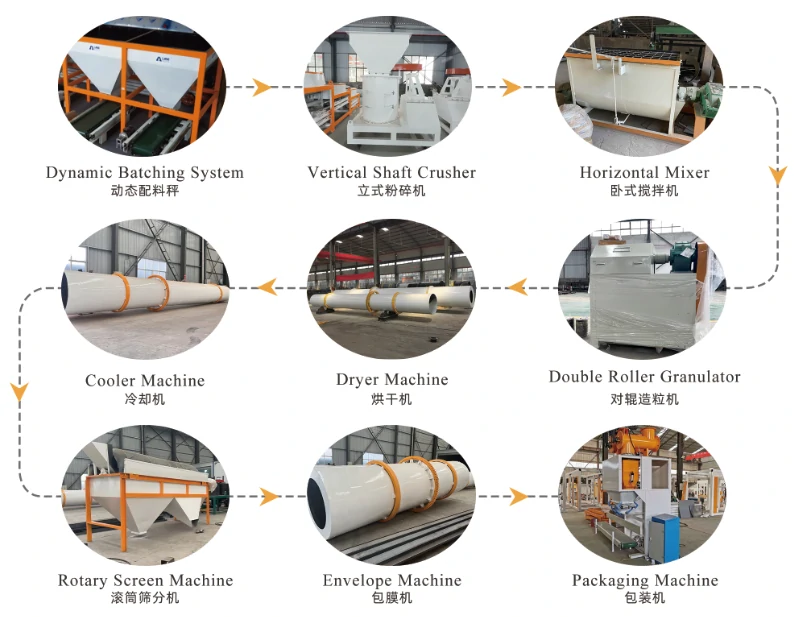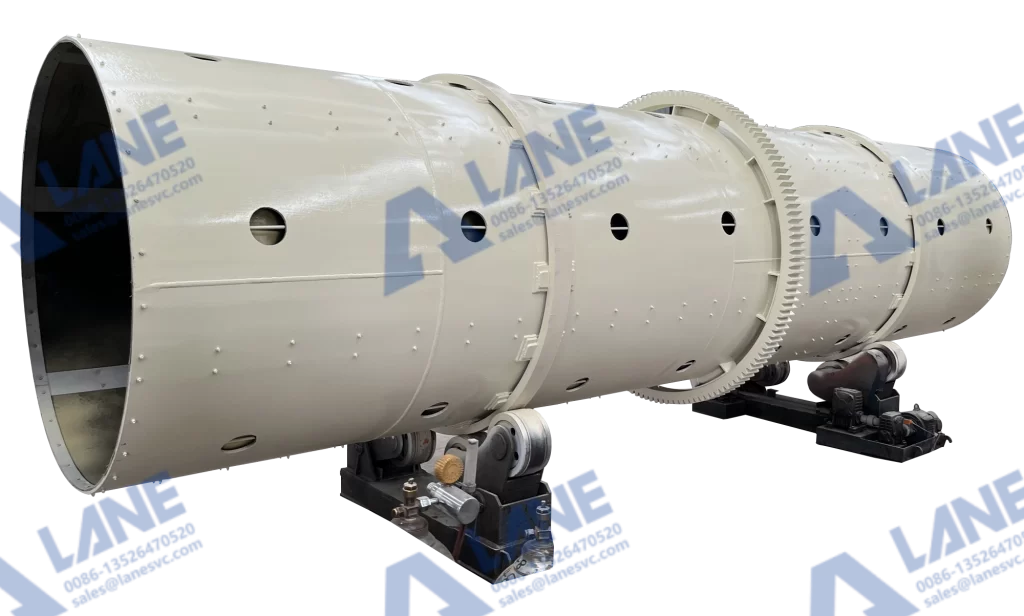In the rapidly evolving agricultural sector, the demand for sustainable and efficient fertilization solutions is increasing. NPK granular organic fertilizer is an environmentally friendly and highly efficient chemical fertilizer substitute, designed to improve soil health, increase crop yields, and promote sustainable agricultural practices. This fertilizer combines essential nutrients – nitrogen (N), phosphorus (P), and potassium (K) – with organic matter, providing a balanced nutrient supply, enhancing soil structure, and promoting healthy plant growth. In this article, we will delve into the production process of NPK granular organic fertilizer, its benefits, real-world applications, and how LANE’s advanced systems are transforming the way fertilizer is produced worldwide.

What is NPK Granular Organic Fertilizer?
NPK granular organic fertilizer is an organic fertilizer containing three main nutrients: nitrogen, phosphorus, and potassium, often simply referred to as NPK. These nutrients are crucial for plant growth and play a vital role in enhancing soil fertility. This fertilizer is produced by mixing organic substances such as animal manure, compost, and plant residues with these key nutrients to form a balanced fertilizer mixture.
This granular fertilizer is easy to apply and ensures slow-release of nutrients, thereby providing plants with a long-term and stable supply of nutrients. It is highly effective whether used on large-scale farms or in small gardens.
Benefits of NPK Granular Organic Fertilizer
Balanced Nutrient Supply: One of the most significant advantages of NPK granular organic fertilizer is its balanced nutrient content. With the perfect blend of nitrogen, phosphorus, and potassium, this fertilizer provides plants with a steady supply of essential nutrients, promoting optimal growth, root development, and resistance to diseases.
Improved Soil Health: Beyond just providing nutrients, NPK granular organic fertilizer helps improve soil structure. Organic matter in the fertilizer enhances water retention, aeration, and drainage. It also promotes the growth of beneficial soil microorganisms, leading to healthier, more fertile soil.
Sustainable and Eco-Friendly: Unlike synthetic fertilizers, NPK granular organic fertilizer is made from organic materials, which helps reduce the environmental impact of farming. By recycling waste products, it helps reduce landfill waste and provides an eco-friendly alternative to chemical fertilizers, which can harm the environment.
Slow-Release of Nutrients: Granular fertilizers have the advantage of slow nutrient release, providing a steady supply of nutrients over time. This reduces the need for frequent fertilization and minimizes the risk of nutrient leaching, making it an efficient and cost-effective solution for farmers.
Improved Crop Yields and Quality: When used correctly, NPK granular organic fertilizer leads to higher crop yields, improved plant health, and better resistance to pests and diseases. It also enhances the quality of the produce, making it more nutritious and marketable.
How is NPK Granular Organic Fertilizer Made?
The production process of NPK granular organic fertilizer involves several steps to ensure that the final product has high quality, consistent nutrient content and uniform particle size. The following is a detailed breakdown of the typical production process:
Step 1: Raw Material Collection and Preparation
The first step is collecting and preparing the raw materials. These include organic materials like animal manure, plant residues, compost, and biochar. The organic matter is shredded or ground to reduce particle size and enhance mixing efficiency. Additionally, NPK nutrient sources (such as ammonium nitrate, bone meal, or potassium sulfate) are selected based on the desired nutrient composition.
Step 2: Mixing and Blending
Once the raw materials are prepared, they are mixed together using a horizontal mixer or double shaft mixer. This step ensures that the organic matter and NPK nutrients are evenly distributed, creating a homogeneous mixture. The mixing process also helps to maintain the ideal carbon-to-nitrogen ratio, which is essential for efficient fertilizer production.
Step 3: Granulation
The mixed materials are then fed into a granulator, such as a rotary drum granulator or double roller granulator, where they are shaped into uniform granules. Granulation improves the handling, storage, and application of the fertilizer while ensuring that the nutrients are released slowly over time.

Step 4: Drying and Cooling
After granulation, the fertilizer granules are dried using a rotary drum dryer to reduce moisture content and prevent clumping. The dried granules are then cooled using a cooling drum, ensuring that they are stable and safe for storage.
Step 5: Screening and Quality Control
The granules are passed through a rotary screening machine to separate oversized or undersized particles. This step ensures that only high-quality granules make it to the final packaging stage. The fertilizer is also tested for nutrient content, moisture level, and other quality parameters.
Step 6: Packaging
Once the granules meet the desired quality standards, they are packaged using an automatic packing machine. The packaging process ensures that the fertilizer is sealed and labeled for distribution to farmers and retailers.

Real-World Application: LANE’s Impact on NPK Fertilizer Production
The NPK granular organic fertilizer production line of LANE has had a transformative impact on numerous agricultural producers worldwide. An example is a large farm in Indonesia, which implemented LANE’s innovative system to enhance the efficiency of producing organic fertilizer from local agricultural waste. The farm utilized this solution to mix animal manure, crop residues, and nutrient-rich inputs to produce NPK granular organic fertilizer.
Outcome:
Significantly enhance efficiency: After adopting the LANE system, the production speed of this farm increased by 30%. The automated processes reduced the time for manual operations and fertilizer preparation, thereby shortening the turnaround time for crop fertilization.
Crop yield increase: The use of NPK granular organic fertilizer improved the soil health, resulting in a 18% increase in total crop yield. This was particularly evident in rice and vegetable production. The improvement in soil structure and nutrient availability made the crops healthier.
Economically efficient solution: By being able to recycle organic waste into valuable resources, the farm has saved on external fertilizer costs. This system helps them utilize local raw materials and transform waste into profitable products.
This case highlights how LANE’s NPK granular organic fertilizer production line has enhanced agricultural practices globally, promoted sustainable development, saved costs and improved efficiency.
LANE’s Advantages in NPK Granular Organic Fertilizer Production
When it comes to NPK granular organic fertilizer production, LANE stands out as a leader in providing comprehensive, high-performance systems that meet the growing needs of modern agriculture. Here are the key advantages of choosing LANE’s production line:
1.Customizable Equipment Solutions
LANE offers highly customizable equipment solutions tailored to your specific production scale and raw material type. Whether you’re producing small quantities for local use or large volumes for national distribution, LANE’s systems can be scaled accordingly.
2.High-Efficiency Granulation Technology
LANE’s granulation machines, such as rotary drum granulators and disc granulators, are designed for uniform particle size and optimal nutrient release. This ensures that the fertilizers are not only easy to apply but also provide consistent results throughout the growing season.
3.Energy-Efficient Systems
LANE’s production lines are equipped with energy-efficient drying systems, such as rotary drum dryers, which reduce the energy consumption required for drying the fertilizer, helping to keep operational costs low while maintaining production speed and quality.
4.Advanced Automation and Monitoring
Automation is a key component of LANE’s systems, improving both production speed and consistency. The automated systems ensure that each stage of production, from mixing to granulation and packaging, is monitored and optimized for maximum efficiency. This leads to less human error and more consistent product output.
5.Durability and Long-Term Reliability
LANE designs and manufactures heavy-duty, durable equipment that can withstand continuous use in high-output environments. The use of premium materials ensures that the production line operates efficiently and reliably over the long term.
6.Global Expertise and Support
With projects delivered in over 20 countries, LANE has extensive global experience in helping farms and fertilizer manufacturers scale their operations. Our customer service includes installation support, operator training, and 24/7 technical assistance, ensuring smooth and successful integration of our systems.
Expanding the Possibilities: The Future of NPK Granular Organic Fertilizer Production
The demand for NPK granular organic fertilizers is increasing as the agriculture industry looks for sustainable alternatives to chemical fertilizers. The advantages of these fertilizers are obvious: they can improve soil health, promote plant growth, and are environmentally friendly. With the continuous growth of the organic fertilizer market, technological progress will play a significant role in enhancing production efficiency and customizing fertilizers to meet the specific needs of different crops and soil types.
One significant trend in the future of NPK granular organic fertilizer production is the move towards customized fertilizers. With an increasing number of studies on soil health and the specific nutrient requirements of crops, fertilizer producers will be able to customize their products according to the specific needs of farmers. This makes it possible to produce fertilizers with specific nutrient components, ensuring that each crop can obtain the precise nutrition it needs for optimal growth. By using LANE’s advanced system, fertilizer manufacturers can easily adjust the nutrient components and produce highly customized fertilizers, thereby increasing crop yields and improving soil fertility.
Another significant development in future fertilizer production is the integration of intelligent agricultural technologies. The rise of digital agriculture and Internet of Things devices will enable farmers to monitor soil and fertilizer application conditions in real time and make adjustments as needed to optimize crop growth conditions. LANE’s system has incorporated these intelligent technologies, allowing for precise monitoring of every step of the production process. By integrating real-time data collection and automatic adjustment functions, LANE’s system can enhance fertilizer performance and assist farmers in making crop care decisions based on data.
Sustainability will continue to be the driving force behind future organic fertilizer production. The NPK granule organic fertilizer helps build a more sustainable agricultural system by recycling organic waste into valuable resources. This process not only helps farmers reduce their reliance on synthetic fertilizers but also helps minimize waste. The ability to convert agricultural and food waste into high-quality fertilizers, through creating a closed-loop system, returns nutrients to the soil, thereby supporting a circular economy. By reducing the demand for chemical inputs and better utilizing organic waste, LANE’s solutions are contributing to creating a greener and more sustainable future for agriculture.
In the coming years, the agricultural industry will continue to evolve towards a more intelligent and sustainable direction. As the production of NPK granular organic fertilizers becomes increasingly automated and customized, LANE’s innovative technologies will continue to assist farmers in meeting the growing demand for sustainable and high-quality fertilizers. By adopting these technological advancements, farms can reduce costs, increase efficiency, and contribute to a healthier planet.
NPK granular organic fertilizer is an essential component of sustainable agriculture, offering numerous benefits such as improved soil health, increased crop yields, and environmental sustainability. With the right production line, farmers can efficiently produce high-quality fertilizers that enhance plant growth and reduce reliance on chemical inputs.
By choosing LANE’s fertilizer production line, you invest in a solution that maximizes efficiency, ensures consistent product quality, and supports sustainable farming practices. Whether you are producing fertilizer on a small scale or at an industrial level, LANE provides the expertise and technology needed to take your fertilizer production to the next level.
For more details, please feel free to contact us.
Henan Lane Heavy Industry Machinery Technology Co., Ltd.
Email: sales@lanesvc.com
Contact number: +86 13526470520
Whatsapp: +86 13526470520